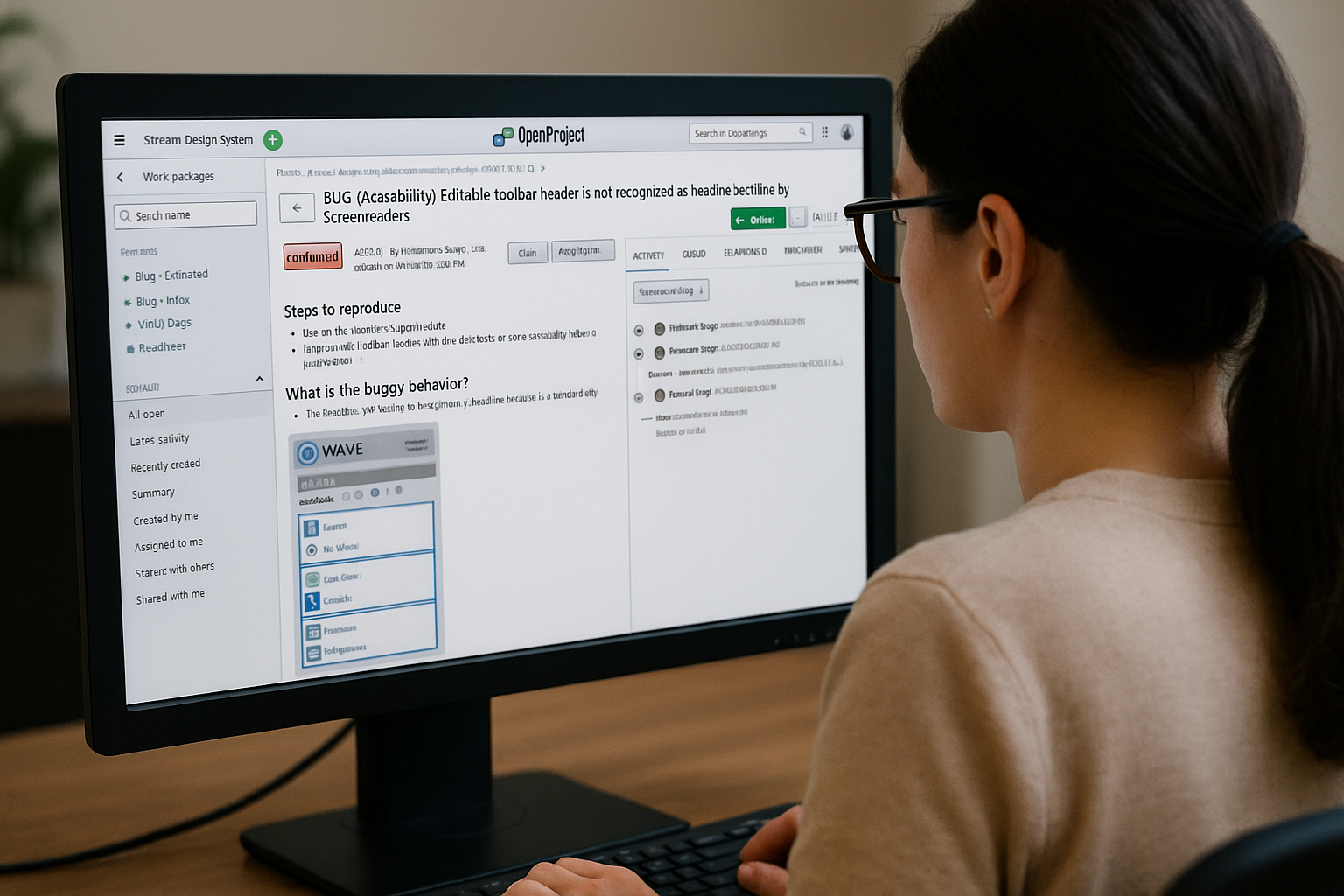
Accessibility at OpenProject: real progress, real impact
Do you know why we forked Redmine back in 2012? The reason was accessibility. At the time, Deutsche Telekom hired us to remove various barriers in Redmine. When the Redmine maintainers showed no interest in reviewing our patches, we made the pivotal decision to fork the project. This allowed us to tackle the issue at its root. And it’s absolutely understandable that the Redmine maintainers, working in their free time, didn’t want to deal with ARIA labels and contrast ratios — there are simply more exciting features on the roadmap.
At OpenProject, we believe that everyone should have access to powerful project management tools, regardless of physical ability. Accessibility is not a checkbox for us. It is a core principle and a constant part of our product development.
OpenProject is accessible to a very large extent. Over the past years, we have invested heavily in making OpenProject more accessible and we have made great progress. With each release, we bring improvements with regard to accessibility. Our goal is clear. We want to be among the leading software providers when it comes to accessibility in open source project management.
Over the next couple of weeks we plan a series of articles to share our lessons learned. There have already been a great number of achievements with regard to accessibility and a list of prioritized topics to be addressed:
- Audit by the German Federal Ministry of the Interior (as part of the openDesk initiative)
- High-contrast mode
- Accessible design system based on GitHub Primer
- 20 releases with 64 accessibility improvements (progress report)
- Accessible date pickers for complex scheduling tasks
- Automate accessibility testing to avoid regressions
- Screenreaders and ARIA live regions
- Lessons learned when building the accessible TreeView component for our design system #62667
Why accessibility matters to me
This commitment is not just professional. It is also personal. After finishing school, I completed my civil service by assisting a high school student in his final year. He had a severe physical disability caused by illness. He could no longer walk and could barely operate a mouse. Working with him gave me a deep and lasting understanding of how much accessibility in technology can shape participation and independence.
This experience still resonates with me today and influences how we approach our work at OpenProject.
We have published an official Accessibility Statement on our website that reflects our ongoing commitment.
Building an accessible design system for OpenProject
In 2023, we made a key decision. We would build every new interface in OpenProject using an accessible design system. We chose GitHub Primer as the foundation. It provides robust and accessible core components, addressing crucial topics like color contrast and screen reader compatibility.
We wrote about our decision and process in more detail in this blog article.
A dedicated team of designers and developers is continuously expanding our internal design system based on Primer. These components are reusable across the application, helping us ensure consistency and accessibility everywhere.
Every new view in OpenProject is now developed using this system.
Accessibility is complex and costly
Building accessible software is difficult. It requires deep technical knowledge, specialized design skills, and constant testing. It is also expensive. But it is worth it.
Modern collaborative platforms must support rich interactions like drag and drop or visual timelines. These features are helpful for many users, but they are a challenge for people who rely on screen readers. We work hard to create strong and usable alternatives.
A good example of our commitment is the introduction of the High Contrast Mode. This feature allows users with limited vision or visual impairments to work with OpenProject in a color scheme optimized for clarity and contrast. It improves legibility and reduces eye strain, especially in long working sessions.
To prevent regressions, we run automated accessibility tests with every build. These tests help us detect and fix issues early, long before they can affect our users.
We are grateful to be supported by ZenDiS, who help us with both funding and accessibility expertise. Their support enables us to move faster and with greater confidence.
Independent accessibility audit
The German Federal Ministry of the Interior commissioned an external test of OpenProject’s accessibility. The full test report can be found here (PDF).
We carefully reviewed the findings and resolved many of the reported issues. A list of the items we have already addressed is available in our community tracker.
We continue to improve. Our public roadmap lists further accessibility improvements that are planned for upcoming releases.
Working with the community
OpenProject is built with the support of other open source projects. We use libraries like CKEditor 5, FullCalendar, NG Select, and of course GitHub Primer. These libraries are essential to OpenProject. They save us thousands of hours of work and allow us to focus on what makes our platform unique.
We are happy to see that accessibility is becoming more important in these projects. When a component does not meet all our needs, we contribute back. One example is our work on a Tree View component for Primer, which we are developing to be fully accessible and available for the whole community.
What comes next?
We are not done. Accessibility is a continuous journey. We are proud of the progress we have made. And we are committed to going even further.
Thus, we are moving forward with every release. We eliminate barriers, improve features, and train our teams to consider accessibility from the very beginning and incorporate it in their decisions. That means during planning, design, development, and testing.
Here you find a list of the improvements planned for the next releases:
👩🏾🦯👨🏼🦯Accessibility - know problems and next steps
If you are interested in accessibility at OpenProject and would like to learn more about it, please feel welcome to contact us. Hearing about the real experiences of our users is very valuable to us.


